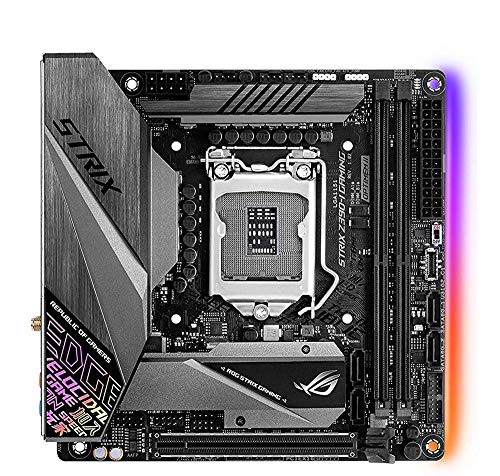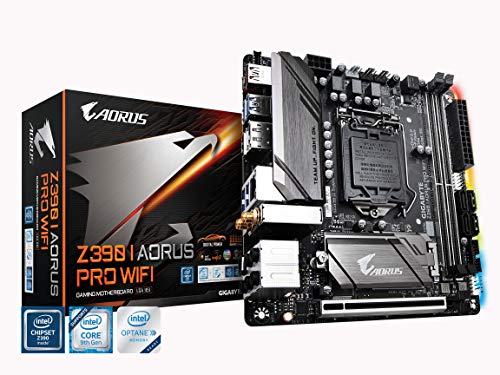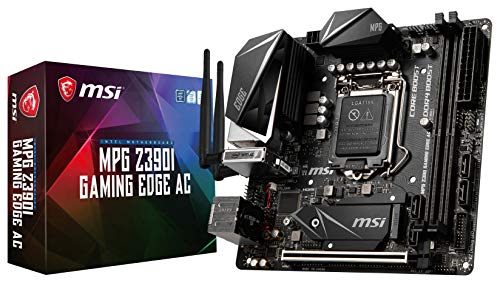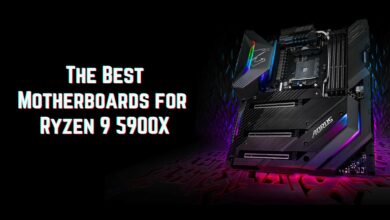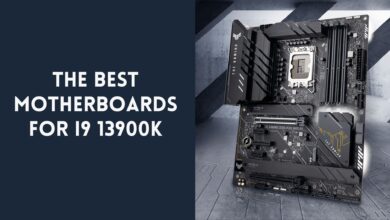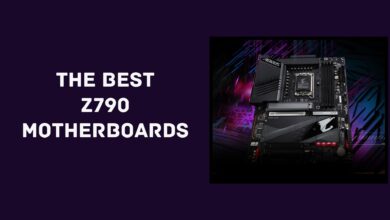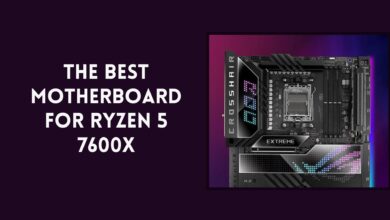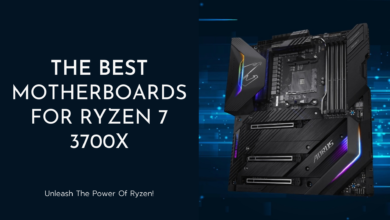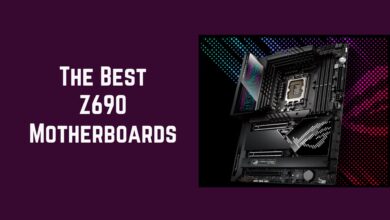Best Mini ITX Motherboards For Intel Core i9-9900k
Regardless of whether you’re a fan of Intel or AMD, choosing a motherboard for that new processor you just got is vital. Not just that, you have to make sure that your pick is the one that can give you the best results. When Intel announced the new i9 9900k, it was met with widely positive approval. Everyone wanted to see the 8 core processor in its full potential. However, in order to fully harness the power of the Z390 chip, you need a motherboard with enough juice in it. We also have a complete Best Motherboards For I9-9900k Guide that includes all sizes motherboards.
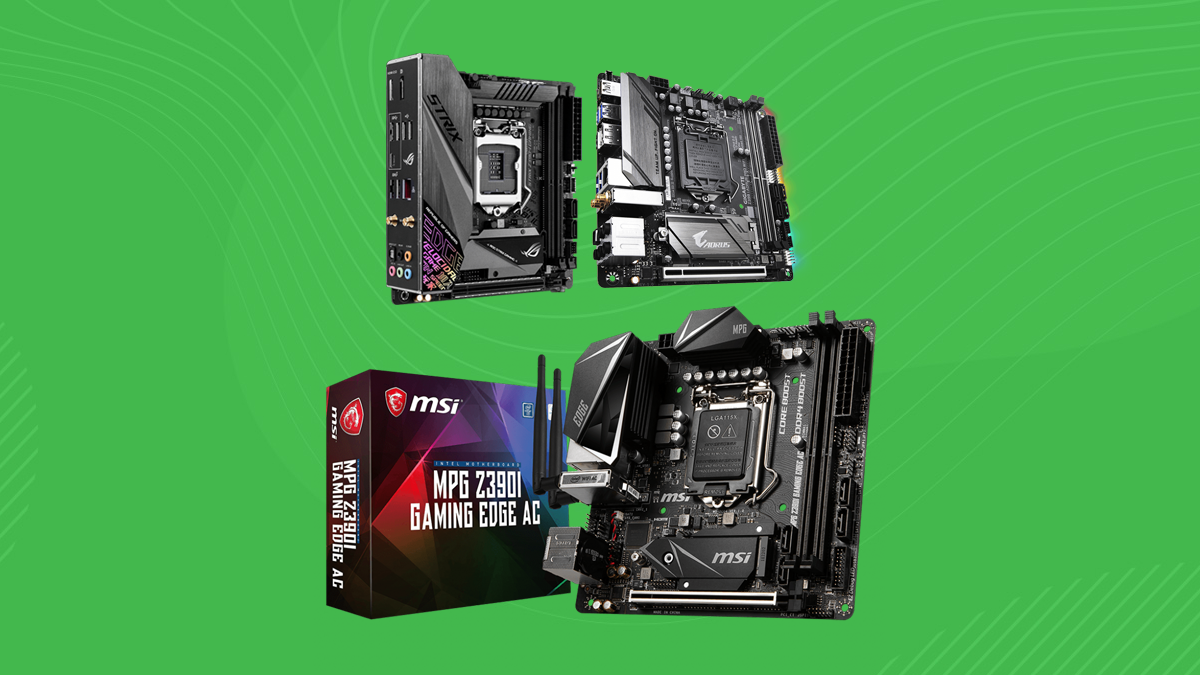
Therefore, today we’ll be helping you decide which motherboard is the best for your i9 9900k. However, today’s list is going to be going over the best ITX motherboards for your Z390 chip. After all, we have to help the minicomputer enthusiasts join in on the club as well. So, without delaying this any further, let’s get right on it.
1. ASRock Z390 Phantom Gaming-ITX
Great Price/Performance Ratio
Pros
- 5x USB Gen-2 ports for 10Gbps transfer rate
- Thunderbolt 3 port
- Fan array heatsinks
- Additional M.2 slot on the back
Cons
- No Gen 2 ports in the front panel
Maximum Resolution: 4096x2160 @ 30Hz | Chipset: Intel Z390 | Socket: LGA1151 | Graphics Output: Thunderbolt 3, HDMI and Display Port 1.2 | RAM Slot: DDR4 4500Mhz | PCIe Slots: 1x PCIe 3.0 x16 | Number of USB ports: 5x USB Gen-2, 2x USB Gen-1
Coming up first in our list is the ASRock Z390 Phantom motherboard, truly a beast. This motherboard is one of the most modern and demanding ones put out there by ASRock. Sure, it comes with a slightly hefty price but it justifies that with what it does and offers. The Z390 Phantom motherboard represents ASRock’s new line of products, replacing Fatal1ty.
Similar Motherboards: Best A320 Motherboards
The Z390 Phantom bears resemblance to some of ASRock’s Fatal1ty motherboards in terms of colour and design. It sports a completely black look and it’s pretty evident that this motherboard is more focused on performance than design. However, that does not mean that ASRock has done a poor job with the aesthetics. You will get a few RGB LEDs under the PCIe slot which are customizable by ASRock’s Poly Chrome software. The Z390 really shines when it comes to port availability as it has one of the most generous I/O ports available in the ITX motherboards category. It comes with 6 USB 3.0 ports, a standard audio jack box, Ethernet port, and a legacy PS/2 port. But where this motherboard really shines is the addition of Thunderbolt 3 which can handle speeds of up to 40Gb/s.
It should be noted that the heatsinks are not like the typical aluminium blocks that have been popularized. These are real fin array heatsinks that greatly disperse heat and keep the temperatures down. Moving on, you have 1 PCIe 3.0 x16 slot available for GPU installation. There are RGB lights underneath the PCIe slots for a little bit of colour flair. Additionally, you can have a maximum of 32 Gigs of RAM in the two DDR4 DIMM dual channel slots.
Heat management, temperature control, VRM quality and overclocking are the most important contributors in harnessing the full force of the i9 9900k. Therefore, it is imperative that this motherboard, being top of our list, should excel in those. And it truly does. With the true fin array heatsink, it is capable of dispersing and maintaining low levels of heat. As for the VRM, you have a 7 phase setup- 5 phases for CPU and 2 phases for integrated graphics. The Vcore VRM is also a 5 phase setup controlled by ISL 99 controllers that come with temperature monitoring, which is a bonus
The ASRock Z390 Phantom is a phenomenal piece of hardware for the i9 9900k. It has all the bells and whistles and performs incredibly well. With this motherboard, there is little that can go wrong. It has ideal VRM quality and temperature control for the over
clocking enthusiasts. The only real downside with this is that there are no Gen 2 ports in the front panel. But get past that and you’ll surely be buckled in for a terrific experience.
2. ASUS ROG Strix Z390 I-Gaming
Best-Looking ITX Motherboard
Pros
- 7x USB 3.0 ports
- A lot of RGB lightings
- Efficient power handling
- Bluetooth 5.0
Cons
- Inefficient port placing
Maximum Resolution: 4096 x 2304 at 60Hz | Chipset: Intel Z390 | Socket: LGA1151 | Graphics Output: HDMI and Display Port 1.2 | RAM Slot: DDR4 4600Mhz | PCIe Slots: 1x PCIe 3.0 x16 | Number of USB ports: 3x USB Gen-2, 2x USB Gen-1 and 2x USB 2.0
Asus’ ROG line of products is almost always found in a list counting down certain best products. And their Strix Z390 is not far away from that either, coming in at the second spot of our list. The Asus ROG Strix Z390 and the ASRock Z390 Phantom are not far apart from each other. On the outer surface, they both perform very similarly and offer more or less the same features. Let’s find out more about those.
Upon opening and unpacking this board, you’ll find that Asus has not skimped out on the aesthetics at all. The Strix Z390 houses a rather neutral black and dark grey colour with very dominant heatsinks covers. RGB fanatics can rest easy as there are RGB strips underneath the 24 pin power connector. Additionally, you have the option to add more strips too if needed. For matters concerning the port availability, you can be assured that Asus has you covered. The I/O shield is fully integrated on the motherboard with a total of 7 USB ports. More specifically, there are 3x USB Gen-2, 2x USB Gen-1 and 2x USB 2.0 ports on this board.
More like this: Best B450 Motherboards
Unlike the ASRock Z390 Phantom, this motherboard has the traditional aluminium block heatsinks. Underneath one of the heatsinks is an extra M.2 slot. On top of that, you get a secondary M.2 slot on the bottom of this board, but without the heatsink. For display, you have an HDMI 2 for a maximum resolution of 4096 x 2160 at 60 Hz and a Display Port for 4096 x 2304 at 60 Hz. Additionally, it supports 2x DIMM DDR4 memory slots for a maximum of 64 Gigs of RAM at 4800 Mhz.
The ASP1401CTB PWM controller is working at 6 phases (4 + 2 configuration). That means that 4 phases are reserved for VRM whereas 2 for integrated graphics. And with this new chip, Asus promises improved voltage handling with fewer drops to overload switching. While this motherboard and its large heatsinks work well to keep the temperatures down even while overclocking, the Z390 Phantom still does a better job. That is largely due to its better heatsinks and phase system. However, the difference is not really that large as to render this board obsolete. Additionally, you may find that the placing of the ports is rather inconvenient as it gets blocked up with tangled cables.
Similar Reads: Best Z590 Motherboards
The Asus ROG Strix Z390 is, without a doubt, a great motherboard. It might leave a bigger dent in your wallets but, rest assured, you’re getting what you pay for. It has top of the line components with all the checks in the right places. The only thing that troubled us was the fact that the ports are placed quite close to each other. And as such, you might end up having access blocked to some of the ports. But if you can get past that and have some extra bucks to spare, then there really isn’t any reason why you shouldn’t opt for the Strix Z390.
Ultimately we used this very motherboard to test our favourite smallest mini-itx cases we reviewed previously.
3. GIGABYTE Z390 Aorus Pro WiFi
Best RGB Lighting
Pros
- Great audio chip
- Supports 64 Gigs of RAM
- Built-in WiFi module
Cons
- Price does not justify the features
- Temperature control not as good as Strix Z390 and Z390 Phantom
Maximum Resolution: 4096 x 2304 at 60Hz | Chipset: Intel Z390 | Socket: LGA1151 | Graphics Output: HDMI and Display Port 1.2 | RAM Slot: DDR4 4600Mhz | PCIe Slots: 1x PCIe 3.0 x16 | Number of USB ports:4x USB 2.0, 1x USB Type-C, 2x USB 3.1 Gen 2, and 3x USB 3.1 Gen 1
Moving on with our list, we have the Gigabyte Z390 Aorus Pro WiFi, the ITX version of the original ATX model. This motherboard is all fired up and ready for the 8th and 9th generation of Intel processors. The Aorus line of products by Gigabyte is aimed exclusively at the enthusiast and fanatic gamers. And with the Aorus Pro WiFi edition, they seem to have taken a step back and produced a more affordable version of the motherboard.
As we have witnessed before, almost all of Aorus Pro motherboards have the same colour scheme- black orange and silver. Additionally, with this motherboard, there is plenty of RGB demands to go about as there are 4 additional headers for RGB strips. The back panel has a metallic I/O port that is integrated onto the board itself for protection. As for the number of USB slots, this motherboard clearly takes the win. It has 4x USB 2.0, 1x USB Type-C, 2x USB 3.1 Gen 2, and 3x USB 3.1 Gen 1 ports. A pretty generous number in our opinion. Moreover, in the back I/O panel you’ll also find the traditional 5 pin audio box, 1x HDMI port, and 1x RJ-45 port.
Much like the industry-standard set as of late, this too has aluminium metallic blocks for heatsinks on the PCIe and M.2 slots. Speaking of the two, there are 2x M.2 slots with one being on the rear side of the PCB and 2x PCIe 3.0 x16 slots to go about. As far as memory goes, 2x DDR4 DIMM dual channel slots can hold up to 64 Gigs of RAM. And lastly, for display, you have the traditional HDMI 2 and Display Port 1.2 ports for connectivity supporting 4096 x 2160 and 4096 x 2304 Hz at 60 fps resolution respectively. Upon inspecting the power phase and the quality of the components, we expected slight to no heating issues. The board only started heating up when we were overclocking and playing games at ultra settings. But these can easily be avoided too if you take the necessary precautions.
Other Motherboard Guides: Best X299 Motherboards
Overall, we’re happy with this board. But we did notice some bugs with the BIOS when trying to alter or tweak things here and there. As far as the performance goes, the Z390 Aorus Pro performed as expected from a $200 motherboard. But then again, is the WiFi on the motherboard really worth that much? We will leave that up to you to decide but know this, for the same price, you can get better performance out of the previous two mentioned boards.
4. MSI MPG Z390I Gaming Edge AC
Simplistic Design
Pros
- Performs really well for the price
- Realtek ALC892 chip works very well
Cons
- No M.2 heatsink
- No USB Type-C header
- Not suitable for long term overclocking
Maximum Resolution: 4096 x 2304 at 30Hz | Chipset: Intel Z390 | Socket: LGA1151 | Graphics Output: HDMI and Display Port 1.2 | RAM Slot: DDR4 4600Mhz | PCIe Slots: 1x PCIe 3.0 x16 | Number of USB ports: 3x USB Gen-2, 2x USB Gen-1 and 2x USB 2.0
Moving further down the list, we must also address some of the budgeted picks. They cut down on some of the features while retaining the cores. And this is where the MSI MPG Z390I Gaming Edge- what a mouthful of a name- comes to play. Before proceeding further, it should be noted that this motherboard may not have all the bells and whistles of the previous three titles mentioned. But, with MSI’s name attached, you can be sure that their product will not leave a bad taste.
Despite cutting down the cost, this motherboard is still ensured by MSI’s Steel Armor Protection. It sports the much-approved standard of black and grey colour which, at this point, is pretty neutral. But right out the bat, you’ll notice that the MPG Z390I does not have a heatsink hovering over the M.2 slot. With ITX motherboards being prone to heating issues, the omission of an M.2 heatsink might be a dealbreaker for some. As for the USB ports, you have 2x USB 3.1 Type-A, 4 x USB 3.0, 4x USB 2.0. Unfortunately, there is no USB Type-C header embedded on the PCB. A price to pay for a low-cost board. Additionally, you get the standard 5 audio jacks connected to Realtek ALC892 audio chip along with an 802.11 ac WiFi module.
Other Motherboard Reviews: Best X399 Motherboards
Due to the missing heatsink, and a few other internal component cuts, this motherboard ended up getting heated up rather quickly. In our tests, we overclocked the i9 9900k by hitting 5GHz and then ran The Witcher 3 and Far Cry 5 on maximum settings. The tests resulted in not just slower loading times but higher overall temperatures as well. Perhaps that is the tradeoff between cheaper price and temperature optimization. Therefore, we recommend this for those who’re not just on a tight budget but won’t be doing any overclocking. As for the display, this motherboard has HDMI and Display Port for video connections.
To sum up the MSI MPG Z390I Gaming Edge AC, we really would like to recommend this for the budgeted builders. Not only that, even if you are looking for the best performance, features, and ports, we would still highly recommends this motherboard. However, for the more overclocking and high power-driven enthusiasts, this board may not be the best choice for you. While it can technically overclock your i9 9900k, the rise in temperatures will end up throttling your overall working performance.
5. Supermicro C9Z390-CG-IW
For Beginners
Pros
- SATA ports are right-angled
- Heatsinks cover the phase block for better temperature control
Cons
- Cuts out on the aesthetics
- Stock settings need to be tweaked quite a lot
- No USB 2.0 on front panel
Maximum Resolution: 4096 x 2304 at 30Hz | Chipset: Intel Z390 | Socket: LGA1151 | Graphics Output: HDMI and Display Port 1.2 | RAM Slot: DDR4 2400Mhz | PCIe Slots: 1x PCIe 3.0 x16 | Number of USB ports: 3x USB Gen-2, 2x USB Gen-1 and 2x USB 2.0
And now, the last but not the least is the Supermicro C9Z390-CG-IW motherboard. There aren’t many boards out there who can properly power the i9 9900k to its full, and finding them in ITX form factor is even rarer. The Supermicro C9Z390-CG-IW is relatively new to the market when compared to all the previous 4 motherboards in our list. However, it made its mark by implementing a new and updated VRM design.
Similar Reads: 5 Best X470 Motherboards
To start off, we should first address the build. Despite this motherboard having a $200 price tag, the aesthetics department offers nothing special. With an extremely simple colour blend of black and silver, this board does not really stand out. There are no particular design attempts on neither the VRM heatsink nor the chipset one. Luckily, where the design skimps out, the rear I/O shield picks it up. It has 2x USB 3.0, 3x USB 3.1 Type-A and 1x USB 3.1 Type-C ports. Along with that, you also have a legacy PS/2 port, HDMI, Display Port 1.2, 1x RJ-45, 2x WiFi antenna and the standard audio box ports. The ports are all ideally spaced but we were sad to see that there was no clear CMOS button. This means that the CMOS battery must be unplugged and plugged back in if a failed clock occurs.
This board has the TDA21470 MOSFETS which, according to the official datasheet, are 95% efficient. The schematics of the PCB show that this board has a 7 phase layout (5+2). Moreover, the construction is very intricate as the blocks are spread in a way as to let the heatsinks cool the CPU. Moving on, this board has a single 1x PCIe 3.0 x16 interface. And regarding memory, it can take up to 64 Gigs of RAM on 2x DIMM DDR4 slots. There seemed to be a problem with the stock settings of the BIOS which were bottlenecking our i9 9900k’s performance. There hasn’t been an official update on the firmware yet, and we’re hoping to have that soon. However, it took a bit of tweaking before we could get the maximum performance out of it.
Getting the Supermicro C9Z390-CG-IW to properly work and maximize usage of the CPU was a bit of a ride. The BIOS puts up quite a few challenges. Additionally, with this big a price tag, you surely are getting the performance you desire but at the expense of aesthetics. Spending a vast amount of money on your hardware, you ought to be able to show it off to others. Unlucky for Supermicro C9Z390-CG-IW’s buyers, they’ll have to harness their i9 9900k’s power with their motherboard tucked behind. This our counter-part guide to the main i9-9900k motherboard guide, so while you are here, also check out the Best A520 Motherboards.
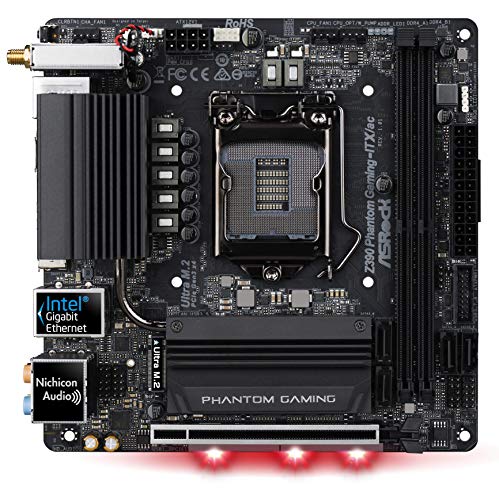
 Check Price
Check Price